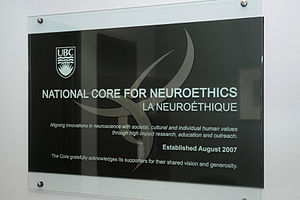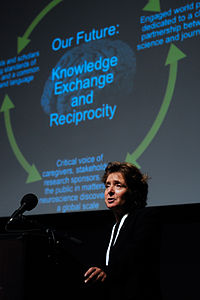- National Core for Neuroethics
-
National Core for Neuroethics Name National Core for Neuroethics Logo 
Region Vancouver Province British Columbia Country Canada Coordinates 49°15′40″N 123°07′28″W / 49.26111°N 123.12444°WCoordinates: 49°15′40″N 123°07′28″W / 49.26111°N 123.12444°W Type Research Speciality Neuroethics Affiliation UBC Faculty of Medicine Established 2007 Website http://www.neuroethicscanada.ca The National Core for Neuroethics at the University of British Columbia was established in August 2007, with generous support from the Canadian Institutes of Health Research, Institute of Mental Health and Addiction, Canada Foundation for Innovation, the British Columbia Knowledge Development Fund, the Canada Research Chairs program, the UBC Brain Research Centre and the UBC Institute of Mental Health[1]. Led by Dr. Judy Illes, the Core has asserted itself on both the national and international stage as a forerunner in the field of neuroethics, with particular focus on ethics in neurodegenerative disease and regenerative medicine, international and cross cultural challenges in brain research, neuroimaging and ethics, the neuroethics of enhancement, and personalized medicine[2].
The Core's major research projects are focused on high impact, high visibility areas including the use of drugs and devices for neuroenhancement, ethics in neurodegenerative disease and regenerative medicine research, international and cross-cultural challenges in brain research, neuroimaging in the private sector, and the ethics of personalized medicine, among others. Members of the Core also lead initiatives aside from their research projects.
Considerable attention has been given to the Core by both the scholarly and non-academic media, with the Core featured in the New York Times[3][dubious ], the Vancouver Sun[4], on the Canwest Global Newshour[5], and in the journal Science[6], amongst many others. As an effort to engage the public in neuroethics discussion, the Core has recently started an online blog.[7] With the rapid pace of technological advance in the field of neuroscience, the National Core for Neuroethics is poised for continued expansion and success.
Contents
Mission
The National Core for Neuroethics strives to tackle the ethical, legal, policy and social implications of frontier neuroscience through high impact research, education and outreach to ensure the close alignment of innovation and human values[8].
Vision
The Core has a vision that neuroscience is applied for maximum knowledge, health and well-being through the early integration of ethics and research, a collective understanding of neuroethics, and the development of policies as the science unfolds[8]. To this end, the Core holds six key values that it uses to guide its research, education, and outreach activities:
Integrity: Uphold high moral and ethics principles in all aspects of neuroethics research, education and outreach
Innovation: Pursue creative and novel approaches to long-standing and nascent issues in neuroethics
Leadership: Inspire and motivate high impact neuroethics research, education and outreach
Teamwork: Respect the diversity and individuality of thoughts, ideals and beliefs
Partnership: Actively engage collaborators and stakeholders
Responsiveness: Promote sensitivity to research, education and outreach needs of the external environment
People
The Core is led by Judy Illes, PhD, Canada Research Chair in Neuroethics and Professor of Neurology at the University of British Columbia[1].
Peter Reiner, PhD, Professor of Psychiatry at the University of British Columbia, is a Senior Faculty Member with the Core[1].
Funding
The Core currently receives financial support from the Canadian Institutes of Health Research, Institute of Mental Health and Addiction, Canada Foundation for Innovation, the British Columbia Knowledge Development Fund, the Canada Research Chairs program, the UBC Brain Research Centre, the UBC Institute of Mental Health, the National Institutes of Health, the Vancouver Coastal Health Research Institute, the British Columbia Rural and Remote Health Research Network, the Harvard NeuroDiscovery Center's Foundation for Ethics and Biotechnology, the North Growth Foundation, the Greenwall Foundation, the Stem Cell Network, the Dana Foundation, the Canadian Dementia Knowledge Translation Network, and Imperial Oil[1].
Inauguration
In September 2008, the Core celebrated its first anniversary with an inauguration celebration held at the Chan Centre for the Performing Arts at the University of British Columbia. In attendance were several international dignitaries in the field of neuroethics, including Dr. Joseph Fins (Chief of the Division of Medical Ethics at Weill Cornell Medical College)[9], Dr. Barbara Sahakian (Professor of Clinical Neuropsychology at the Department of Psychiatry, University of Cambridge School of Clinical Medicine)[10], Dr. Eric Racine (Research Unit Director, Institut de recherches cliniques de Montréal)[11], and Dr. Rémi Quirion (Scientific Director, Institute of Neurosciences, Mental Health and Addiction (INMHA))[12].
References
- ^ a b c d http://www.neuroethics.ubc.ca/index.html
- ^ http://www.neuroethics.ubc.ca/research.html
- ^ "India’s novel use of brain scans in courts is debated. New York Times, September 2008.
- ^ Illes, J. "The perilous pursuit of perfection: Neuroscience has been used to provide athletes a mental edge, but it raises ethical issues." The Vancouver Sun, 8 September 2008. [an editorial by the Core's leader
- ^ Post-traumatic stress drug. The News Hour, Global BC, November 2008.
- ^ Retention's the thing. Science, August 2008.
- ^ http://neuroethicscanada.wordpress.com
- ^ a b Lau P., Chahal, N. Lombera, S. National Core for Neuroethics Annual Report 2007-2008. 2008, Vancouver, BC.
- ^ http://www.weillcornell.org/jfins/
- ^ http://www.psychiatry.cam.ac.uk/pages/profiles/sahakian.html
- ^ http://www.ircm.qc.ca/en/recherche/statique/unite46.html
- ^ http://www.cihr-irsc.gc.ca/e/9592.html
External links
Neuroethics Research Centres
- National Core for Neuroethics
- Neuroethics Imaging Group, Stanford Center for Biomedical Ethics
- Neuroethics Research Unit
- NovelTechEthics
- Neuroethics.upenn.edu
- The Center for Cognitive Neuroscience, University of Pennsylvania
Neuroethics Blogs
Neuroethics Journals
- Neuroethics
- The American Journal of Bioethics
- The American Society for Bioethics and Humanities
- Virtual Mentor Ethics Journal of the American Medical Association Theme Issue: Ethical Issues in Neuroscience
Neuroethics Societies
Neuroethics Literature Databases
- neuroethics.uni-mainz.de Portal for Neuroethics
- National Core for Neuroethics at the University of British Columbia Publications Page
Neuroethics Resources
Categories:- Bioethics
- Ethics of science and technology
- Neuroscience
Wikimedia Foundation. 2010.


